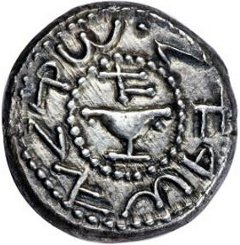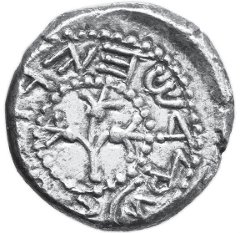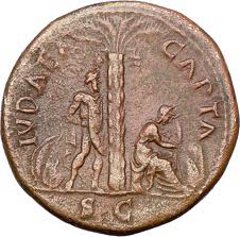Palestinian Authority historical revision: Hebrew Shekel coin from 66 CE is “ancient Palestinian coin”
PA historical revision:
A Judean Shekel coin from the year 66 CE, the first year of the Jewish rebellion against Rome, was sold for $1.1 million this past week at an auction in New York. The words in Hebrew "Shekel of Israel [Year] 1" are printed on the front of the coin, and "Jerusalem the holy" appears on the back. [New York Post, March 10, 2012]
The official Palestinian Authority daily in writing about the auction described the Hebrew coin from the Second Temple period as an "ancient Palestinian coin" and as being part of the "Palestinian cultural tradition." The coin, with the ancient Hebrew lettering, can be seen to the right.
Palestinian Media Watch has documented that the Palestinian Authority regularly publishes denials of Jewish history in the land of Israel. However, this article is different. While claiming that Hebrew coins found in the land of Israel are part of the "Palestinian cultural tradition," at the same time it implicitly acknowledges the Jewish nation's history in the land by mentioning the Jewish revolt against the Romans.
The article adds that the Jews' "political agenda" takes advantage of the sale of ancient Hebrew coins. The PA, which does not recognize Israel's right to exist, and only at times acknowledges that the state does exist, categorizes any archeological evidence of Israel's ancient past in the land as a "political agenda":
"It [the sale] is an opportunity for Jewish and Western scholars to use the Jewish revolt against the Romans in Palestine for a political agenda, and to connect this local revolt with the establishment of the Israeli occupation state."
In addition, the PA daily's claim that the Jewish revolt against the Romans in the years 66 - 70 CE happened in "Palestine" is yet another historical revision. The Jewish revolt happened in the land of "Judea." The Roman coin minted after the Romans destroyed the Temple in the year 70 CE, in honor of Roman victory was inscribed with the words "Judea Capta," meaning "[the land of] Judea is captured." See the coin to the right.
The Romans changed the name of Judea to "Palestine" 65 years later in the year 135 CE, after the Bar Kochba Rebellion, not because of the existence of a local population that called themselves "Palestinians," but in an attempt to distance Jews from their own land, as punishment for the Jewish rebellion.
The following is the article in the official PA daily about the auction of ancient Hebrew coins said to be part of the "Palestinian cultural tradition":
"On March 8 this year (2012), an ancient Palestinian coin will be up for auction in New York for about $1 million. It is a silver Shekel coin, minted in the first century CE, during the Jewish revolt that took place in Palestine during the period of Roman rule.
Despite the fact that the coin in what is called the 'Shoshana' collection is Palestinian, interest in it comes mainly from Jewish groups, or groups supporting Israel, which view the Palestinian heritage from an ideological-political perspective... According to auctioneer estimates... $950,000 is... [the estimated price] attached to the silver Shekel, which was minted a short time after the Jewish revolt against the Romans, which began in May of the year 66 CE. It was the prototype for all the various Shekels minted afterwards. Of this first prototype only two coins have been salvaged; one is perforated, the other, unblemished, is the one up for auction. The management of the Israel Museum has expressed interest in obtaining the coins from the Shoshana collection, and has called upon investors and businessmen to purchase as many of the coins as they are able to, and then to donate them to the museum, or to give them to the museum on long-term loan...
The announcement that the Shoshana collection - including Palestinian coins which were almost certainly stolen and smuggled overseas from Palestine - is up for auction, is an opportunity for Jewish and Western scholars to use the Jewish revolt against the Romans in Palestine for a political agenda, and to connect this local revolt with the establishment of the Israeli occupation state in the 20th century. Usually, Palestinians and Arabs show no interest in antiquities from this period, for reasons which are unintelligible and not convincing; they are influenced by the Israeli and Zionist propaganda, despite the fact that they [the antiquities] are part of the Palestinian cultural heritage."
Judean Shekel coin from 66 CE
is "ancient Palestinian coin" and part
of the "Palestinian cultural tradition"
by Itamar Marcus and Nan Jacques Zilberdik
is "ancient Palestinian coin" and part
of the "Palestinian cultural tradition"
by Itamar Marcus and Nan Jacques Zilberdik
 |
| "Shekel of Israel [Year] 1" |
 |
| "Jerusalem the holy" [New York Post, March 10, 2012] |
The official Palestinian Authority daily in writing about the auction described the Hebrew coin from the Second Temple period as an "ancient Palestinian coin" and as being part of the "Palestinian cultural tradition." The coin, with the ancient Hebrew lettering, can be seen to the right.
Palestinian Media Watch has documented that the Palestinian Authority regularly publishes denials of Jewish history in the land of Israel. However, this article is different. While claiming that Hebrew coins found in the land of Israel are part of the "Palestinian cultural tradition," at the same time it implicitly acknowledges the Jewish nation's history in the land by mentioning the Jewish revolt against the Romans.
The article adds that the Jews' "political agenda" takes advantage of the sale of ancient Hebrew coins. The PA, which does not recognize Israel's right to exist, and only at times acknowledges that the state does exist, categorizes any archeological evidence of Israel's ancient past in the land as a "political agenda":
"It [the sale] is an opportunity for Jewish and Western scholars to use the Jewish revolt against the Romans in Palestine for a political agenda, and to connect this local revolt with the establishment of the Israeli occupation state."
 |
| "Judea Capta" - "Judea is captured" Biblical Archaeology Review, Jan/Feb 2010, 51-53 |
The Romans changed the name of Judea to "Palestine" 65 years later in the year 135 CE, after the Bar Kochba Rebellion, not because of the existence of a local population that called themselves "Palestinians," but in an attempt to distance Jews from their own land, as punishment for the Jewish rebellion.
The following is the article in the official PA daily about the auction of ancient Hebrew coins said to be part of the "Palestinian cultural tradition":
"On March 8 this year (2012), an ancient Palestinian coin will be up for auction in New York for about $1 million. It is a silver Shekel coin, minted in the first century CE, during the Jewish revolt that took place in Palestine during the period of Roman rule.
Despite the fact that the coin in what is called the 'Shoshana' collection is Palestinian, interest in it comes mainly from Jewish groups, or groups supporting Israel, which view the Palestinian heritage from an ideological-political perspective... According to auctioneer estimates... $950,000 is... [the estimated price] attached to the silver Shekel, which was minted a short time after the Jewish revolt against the Romans, which began in May of the year 66 CE. It was the prototype for all the various Shekels minted afterwards. Of this first prototype only two coins have been salvaged; one is perforated, the other, unblemished, is the one up for auction. The management of the Israel Museum has expressed interest in obtaining the coins from the Shoshana collection, and has called upon investors and businessmen to purchase as many of the coins as they are able to, and then to donate them to the museum, or to give them to the museum on long-term loan...
The announcement that the Shoshana collection - including Palestinian coins which were almost certainly stolen and smuggled overseas from Palestine - is up for auction, is an opportunity for Jewish and Western scholars to use the Jewish revolt against the Romans in Palestine for a political agenda, and to connect this local revolt with the establishment of the Israeli occupation state in the 20th century. Usually, Palestinians and Arabs show no interest in antiquities from this period, for reasons which are unintelligible and not convincing; they are influenced by the Israeli and Zionist propaganda, despite the fact that they [the antiquities] are part of the Palestinian cultural heritage."
[Al-Hayat Al-Jadida, March 4, 2012]